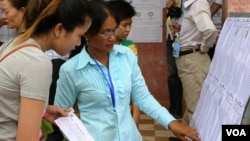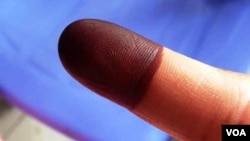The Cambodian government has claimed victory in Sunday's national election, indicating that longtime Prime Minister Hun Sen will extend his 28-year rule despite a strong challenge from a rejuvenated opposition.
A government spokesman said Hun Sen's ruling Cambodian People's Party (CPP) won 68 seats in the nation's 123-member parliament, a significant decline from the 90-seat majority it previously held.
Spokesman Khieu Kanharith said the main opposition Cambodian National Rescue Party (CNRP) took the remaining 55 seats, almost doubling the 29 seats it held in the outgoing parliament.
There was no immediate confirmation from the National Election Committee, which began releasing vote tallies by district on state television late Sunday. Final election results are expected in several weeks.
An independent observer told VOA the vote was the least fair of the elections that Cambodia has held in recent years.
Speaking by phone from Phnom Penh, Committee for Free and Fair Elections in Cambodia director Koul Panha cited several problems, including names of eligible voters not appearing on voter lists, the ruling party dominating media coverage and using state resources to promote itself, security personnel engaging in pro-government activities, and the main opposition party's leader being barred from running as a candidate.
Koul Panha said Sunday's vote produced an estimated turnout of 69 percent, about 6 percent lower than the 2008 election. He said the main reason for the reduced turnout appears to be voters being barred from casting ballots because their names were removed from the voter lists.
That seemed to be the case for Sun Kosal, one of several angry Phnom Penh residents who were turned away at the Maha Montrei Pagoda polling station.
She told VOA that her name and those of her family members were on the voter list for the previous election. "Now when we go to vote this year, we lost the names," she said.
Koul Panha said hundreds of thousands of people faced similar problems in 2008, but that it would take several weeks for his group to determine the extent of the problem this time.
Ahead of the election, Koul Panha also had warned of a flaw with the ink used to mark a voter's finger, saying it could be washed off within minutes using a substance widely available in local markets. He said that raised the risk of people voting more than once.
CNRP leader Sam Rainsy told a news conference his opposition party is waiting for the official results and information from other sources before making an assessment of the election. He urged his supporters to remain calm.
Sunday's vote was largely peaceful. Cambodian police blocked the streets around Prime Minister Hun Sen's residence as a precaution.
Earlier, Sam Rainsy told VOA it was too early to know what the opposition would do if it determines the election's shortcomings are egregious. "We will have to assess the scale of the cheating, the ballot tampering," he said.
The government barred Sam Rainsy from standing or voting in the election, despite enabling him to return to Cambodia from self-imposed exile days beforehand. Officials said Sam Rainsy's registration for the election came too late.
Sam Rainsy had been in exile for four years, avoiding a trial in which he was sentenced to prison on criminal charges that he said were politically motivated. Hun Sen said he arranged for a royal pardon of Sam Rainsy, a longtime political rival, to promote national reconciliation.
The opposition leader campaigned freely in the run-up to the vote and drew large crowds of supporters, suggesting his return had given a boost to the opposition. His party was formed by a recent merger of opposition factions.
Koul Panha welcomed the increased participation of young people in the election campaign, particularly through social media websites such as Facebook.
A Cambodian media consultant and blogger said that participation was a boon to parties looking to engage with younger voters. "When they have Facebook, their relationship with their supporters becomes interactive," Keo Kounila told VOA before the election. "Party supporters have the opportunity to give feedback on party policies. And I think any party benefits from such feedback."
Hun Sen remains a popular figure in Cambodia, one of Southeast Asia's fastest growing economies. He campaigned on a decades-long record of leading the peaceful development of his nation, after decades of turmoil that included the brutal 1975 to 1979 dictatorship of the communist Khmer Rouge.
Sunday's election was Cambodia's fifth since 1993, when the United Nations helped the country stage its first multiparty democratic vote.
Robert Carmichael and VOA's Khmer service contributed to this report from Phnom Penh.
A government spokesman said Hun Sen's ruling Cambodian People's Party (CPP) won 68 seats in the nation's 123-member parliament, a significant decline from the 90-seat majority it previously held.
Spokesman Khieu Kanharith said the main opposition Cambodian National Rescue Party (CNRP) took the remaining 55 seats, almost doubling the 29 seats it held in the outgoing parliament.
There was no immediate confirmation from the National Election Committee, which began releasing vote tallies by district on state television late Sunday. Final election results are expected in several weeks.
An independent observer told VOA the vote was the least fair of the elections that Cambodia has held in recent years.
Speaking by phone from Phnom Penh, Committee for Free and Fair Elections in Cambodia director Koul Panha cited several problems, including names of eligible voters not appearing on voter lists, the ruling party dominating media coverage and using state resources to promote itself, security personnel engaging in pro-government activities, and the main opposition party's leader being barred from running as a candidate.
Koul Panha said Sunday's vote produced an estimated turnout of 69 percent, about 6 percent lower than the 2008 election. He said the main reason for the reduced turnout appears to be voters being barred from casting ballots because their names were removed from the voter lists.
That seemed to be the case for Sun Kosal, one of several angry Phnom Penh residents who were turned away at the Maha Montrei Pagoda polling station.
She told VOA that her name and those of her family members were on the voter list for the previous election. "Now when we go to vote this year, we lost the names," she said.
Koul Panha said hundreds of thousands of people faced similar problems in 2008, but that it would take several weeks for his group to determine the extent of the problem this time.
Ahead of the election, Koul Panha also had warned of a flaw with the ink used to mark a voter's finger, saying it could be washed off within minutes using a substance widely available in local markets. He said that raised the risk of people voting more than once.
CNRP leader Sam Rainsy told a news conference his opposition party is waiting for the official results and information from other sources before making an assessment of the election. He urged his supporters to remain calm.
Sunday's vote was largely peaceful. Cambodian police blocked the streets around Prime Minister Hun Sen's residence as a precaution.
Earlier, Sam Rainsy told VOA it was too early to know what the opposition would do if it determines the election's shortcomings are egregious. "We will have to assess the scale of the cheating, the ballot tampering," he said.
The government barred Sam Rainsy from standing or voting in the election, despite enabling him to return to Cambodia from self-imposed exile days beforehand. Officials said Sam Rainsy's registration for the election came too late.
Sam Rainsy had been in exile for four years, avoiding a trial in which he was sentenced to prison on criminal charges that he said were politically motivated. Hun Sen said he arranged for a royal pardon of Sam Rainsy, a longtime political rival, to promote national reconciliation.
The opposition leader campaigned freely in the run-up to the vote and drew large crowds of supporters, suggesting his return had given a boost to the opposition. His party was formed by a recent merger of opposition factions.
Koul Panha welcomed the increased participation of young people in the election campaign, particularly through social media websites such as Facebook.
A Cambodian media consultant and blogger said that participation was a boon to parties looking to engage with younger voters. "When they have Facebook, their relationship with their supporters becomes interactive," Keo Kounila told VOA before the election. "Party supporters have the opportunity to give feedback on party policies. And I think any party benefits from such feedback."
Hun Sen remains a popular figure in Cambodia, one of Southeast Asia's fastest growing economies. He campaigned on a decades-long record of leading the peaceful development of his nation, after decades of turmoil that included the brutal 1975 to 1979 dictatorship of the communist Khmer Rouge.
Sunday's election was Cambodia's fifth since 1993, when the United Nations helped the country stage its first multiparty democratic vote.
Robert Carmichael and VOA's Khmer service contributed to this report from Phnom Penh.






